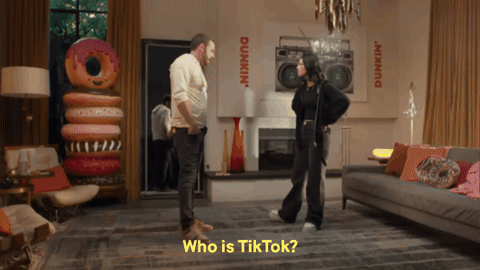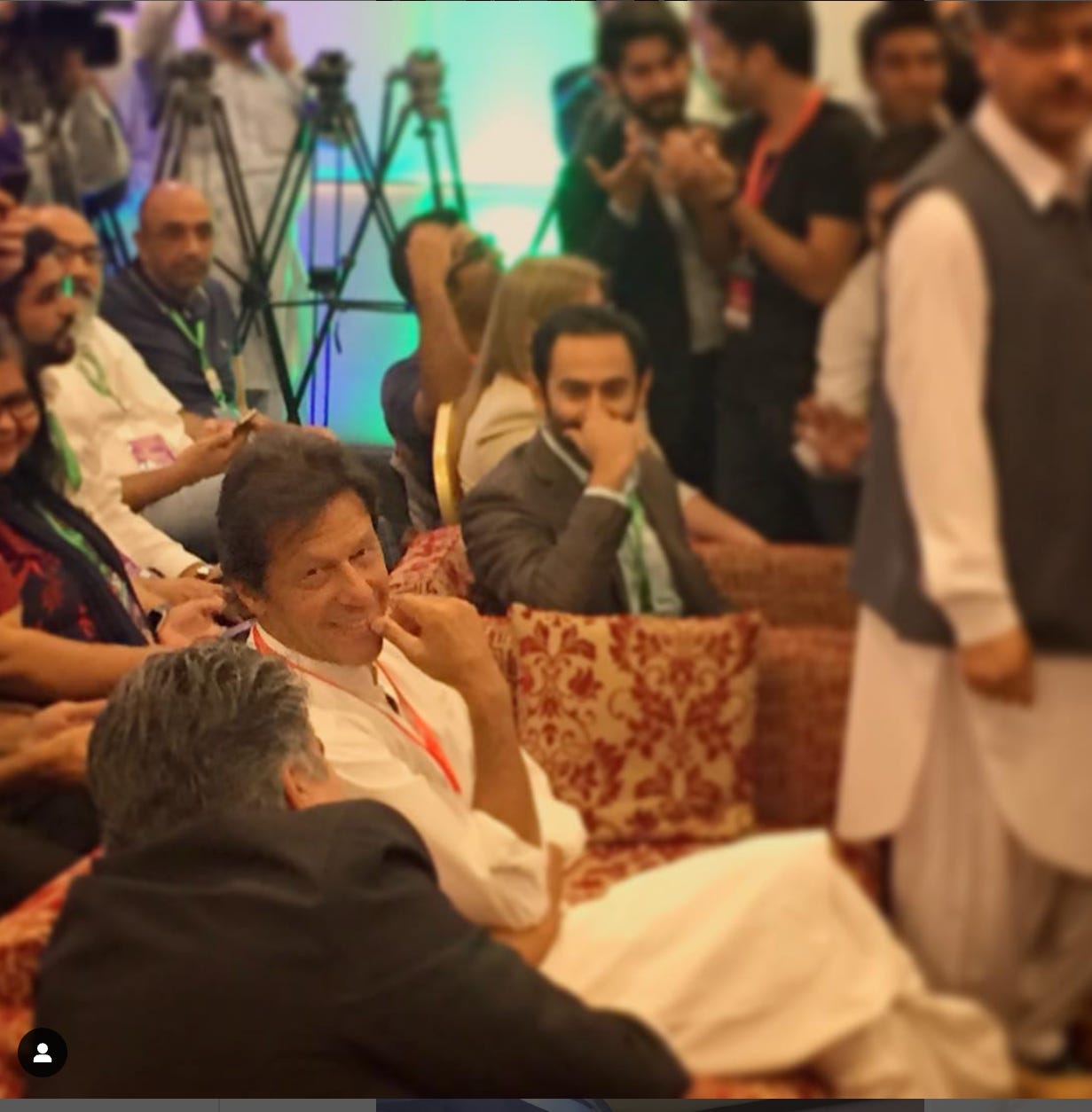Who is TikTok?
February 16, 2024 - Elections in Pakistan and Indonesia
There are reports this morning that Russian opposition leader, Alexsei Navalny is dead.

Hundreds of millions cast votes in Asia over the past week. On February 8, 60 million Pakistanis (down from previous years) voted for the country’s next prime minister. This past Wednesday, 200 million eligible voters in Indonesia, half of whom are under 40, voted for the country’s next president. The results of each election are unique to the particular country. Yet, both showed two things:
The role technology, particularly TikTok and AI, is playing in gaming the supposed “democratic” system.
That if you have political ambitions and stick it out long enough, the system buckles.
Pakistan
Back in 2015, I wrote that, “Pakistan is dysfunctional. With few exceptions, its institutions are weak1. Only the army and the mighty spy agency, the Inter-services Intelligence Directorate (ISI), operate with any degree of effectiveness. Pakistan…swings between kleptocracy and military rule.” That is largely at the military’s behest. Last week’s election results show that the military may not only be out of touch but, as a result, its power is on the decline.
We noted a few weeks back that former Pakistani Prime Minister Imran Khan (who is 71, since we all care so much about age in leadership these days) ran afoul of the military that is responsible for his rise. He formed his Pakistan Tehreek-e-Insaf (PTI) party in 1996. It was not taken seriously until the generals tapped it and Khan in 2018 to lead the country. The military deposed him in 2022.
To ensure that he didn’t pose a threat to the February 8 vote, Pakistan’s generals engineered trumped-up charges, which included an unlawful marriage. The country’s election commission wiped him and PTI’s cricket symbol off the ballot. (Khan is a famous former cricket player, who won Pakistan’s only title in the Cricket World Cup in 1992. That’s for all you Gen Zers who also haven’t watched When Harry Met Sally.)
Pakistan’s generals didn’t count on the power of AI and TikTok.
Khan’s supporters created AI-generated videos of him and disseminated information about the “independents” loyal to PTI that did run — over TikTok and other social media. With 60 percent of the population under the age of 30 and 130 million broadband subscribers, that foiled the generals’ efforts to quash PTI. The party won the most seats, 93 out of 266. Another former PM, Nawaz Sharif’s party, Pakistan Muslim League (PML), won 75 and the Pakistan Peoples Party (PPP), the party of former PM Benazir Bhutto, won 54 seats.
In Bloomberg, Mihir Sharma notes that “Khan has challenged the basic notion that the Pakistan army is the guardian of the state and of its founders’ vision.”
Last week’s vote shows that in the age of AI and TikTok, Pakistan’s generals are no longer that guardian. All things digital have rendered the old tactics to puppeteer government through an anointed candidate and suppress people’s voices obsolete. If you want to do that, you need to get hip with the technology. See China.
Still, as Michael Kugelmann points out, “(i)n the end, Pakistan’s military may get what it wanted all along: a weak and pliable coalition led by its preferred parties.” PML and PPP have tentatively agreed to work together to form a government, freezing out PTI. Many are skeptical that this will sit well with Pakistanis. Watch this space.
And you should: Pakistan is a nuclear state. A weak head of government is a danger in a region that is already aflame.
Indonesia
Meanwhile, in Indonesia, which is the world’s third largest democracy (after India and the United States), the largest Muslim country in the world, and the world’s biggest nickel supplier (a key component of electric cars), catapulted a 72-year-old former general who served under the Cold War dictator Suharto (who ruled from 1967-1998 and apparently only has one name) and had been married to Suharto’s daughter from 1983-1998, (coincidentally the year Suharto was deposed). Prabowo Subianto won over 50 percent of the votes on Wednesday, making a run-off in June unnecessary.
Like Khan’s PTI, he leaned on TikTok. Prabowo, as Ellen Iones points out, managed to sidestep past atrocities and war crimes. During the Suharto regime, he oversaw the abduction of democracy activists in Timor-Leste. Instead, he ingratiated himself with the country’s largely young electorate through awkward dance videos on TikTok.
More significantly, Prabowo, who is 72, benefitted from the long game, even if he didn’t realize he was playing it. He has long sought the top job in Jakarta, unsuccessfully running against the outgoing and hugely popular president, Joko Widodo in 2014 and 2019.
In a “keep your friends close, but your enemies closer” move, Widodo appointed Prabowo his defense minister in 20202. That seems to have happened with an eye to 2024, when Widodo was not eligible to run for a third term, but felt his work was unfinished. Widodo supported his former nemsis and arranged to have Prabowo take his 36-year-old son as his running mate (after getting the courts to reverse a ban on anyone under 40 from standing for election.) Prabowo may be Indonesia’s new president, but Widodo is its kingmaker.
This has many worried about Indonesia’s democratic trajectory. Widodo propelled his country’s growth. Prabowo will be expected to do the same. If he can manage that, while also balancing the great power rivalry between China and the US, it might not matter. — Elmira
I’m opening up my column to others. Please pitch me your op-ed idea/perspective. Let’s get more female perspectives. Email me on endeavoringe@gmail.com or respond to this post.
Elsewhere in the World.....
On our radar...
Indonesia and Pakistan
Who is Indonesia’s new president Prabowo? A former military commander and human rights abuser, someone who has raised eyebrows, says Ellen Iones. (Vox)
Well, Pakistan stunned everyone last week. Despite being imprisoned PM Imran Khan’s party, Pakistan Tehreek-e-Insaf (PTI), (which did not appear on the ballot), won the most seats in parliament. With the country’s generals opposed to Khan assuming the premiership, who will become the next PM? And how will he (unfortunately it will be a he) navigate an ailing economy? Tamanna Salikuddin and Asfandyar Mir lay out the various options and explain why Pakistan’s elections matter to all of us. (Inkstick Media)
Pakistani authorities shut down mobile phone services and internet access across most of the country hours before election polls opened this week. Sudan also shut down the country’s internet last Friday. Ellery Robert Biddle weighs in and explains how technology is controlled by authoritative figures. (Coda Story)
Trump/NATO
A note about NATO and “dues.” NATO is an alliance, not a club. As such, countries agree to spend two percent of their country’s GDP on defense. They do not pay a membership fee, hence no country is “delinquent.” I’m not convinced that Trump recounted an actual conversation with a leader from a NATO nation. Looking at the leaders of the then-29 countries (the alliance is now 31 members, with the addition of North Macedonia in 2020 and Finland in 2023), none appear to be that stupid, or as stupid and fantastical as Trump is.
US
Tucker Carlson’s interview with Vladimir Putin was less revelatory than affirming. The questions and answers showed how much Donald Trump and Russia’s president are aligned on NATO, the Ukraine war, and the world order, writes Samantha de Bendern. Sigh. (Chatham House)
The US is known for a lot – unfortunately, including gun violence. Hawaii, however, handed down a state Supreme Court ruling declaring that individuals outside of the military service have no right to keep or bear arms. Dahlia Lithwick and Mark Joseph Stern discuss this glimmer of hope in the movement against gun violence. (Slate)
Africa
Kenya’s President William Ruto seeks to diversify the country’s development funding, Kana Watanabe says. In a recent report by the Kenya National Bureau of Statistics, China currently accounts for 73 percent of Kenya’s bilateral borrowing, so with China's debt looming, Kenya wants out. (Nikkei Asia)
Senegal’s current president, Macky Sall, postponed the country’s elections set for February 25 to December. Katrin Gansler worries about what this means for a country once considered an island of stability in a region increasingly wracked with instability. (DW)
Asia
This weekend, UN Secretary-General Antonio Guterres will convene a meeting on Afghanistan. It has put the spotlight back on the many countries that do not recognize the Taliban-led government, which took over in August 2021. Annie Pforzheimer and M. Ashraf Haidari make the case against the US re-opening its embassy in Kabul and explain why. (The Hill)
The farmers in India are back. They had come out in full force in 2020, upset at proposed agricultural reforms. As Jenny Moon notes, today “they’ve returned to the streets saying Modi’s administration has not kept its promises.” (Semafor)
The Americas
Drug cartels are going global. Carolina Sampó and Valeska Troncoso explain why cartels are expanding to Asia, specifically China and India. (Americas Quarterly)
In El Salvador, Nayib Bukele may have stamped out the gangs, but it’s soccer that’s building trust. Whitney Eulich looks at how the sport is helping rebuild the social fabric in the Central American country. (CS Monitor)
Europe
Who knew that we’d actually find something to agree with Vladimir Putin on? The Russian leader said that he’d prefer Biden to win the November election, noting that the Democrat is more “predictable.” Sareen Habeshian reports. (Axios)
Western governments have been far too slow to impose restrictions on technology exports to Russia, enabling the country to produce advanced weapons using imported software and microchips. Strengthening these restrictions would benefit not only Ukrainians but also Western taxpayers, argue Anastassia Fedyk, Yuriy Gorodnichenko, and James Hodson. (Project Syndicate)
Support for right-wing parties in Eastern Europe is on the rise. Why? FPI Fellow Maria Snegovaya says that has to do with how the left adopted pro-market policies after the collapse of the Soviet Union and then failed to deliver a better life. She joined the CSIS podcast to discuss this and her new book, When Left Moves Right: The Decline of the Left and the Rise of the Populist Right in Postcommunist Europe. (CSIS)
Italy is considering an agreement with Albania that would send migrants rescued at sea, hoping for asylum in Italy, to detention centers in Albania. Susanna Zanfrini and Harlem Désir worry that in a time when there are already huge numbers of deaths and harm resulting from these migration attempts, this plan will only encourage more. (Euronews)
Those in Northern Ireland are often asked to categorize themselves as either Irish or British, but Emma DeSouza questions, why can’t we be both? DeSouza dives into the highly politicized questions of identity in Northern Ireland. (The Guardian)
The ICJ’s Ukraine genocide case is actually a win for Ukraine and the rules-based order. Charli Carpenter dives in. (WPR)
Middle East
Israel’s campaign of retaliation against Hamas in Gaza is the culmination of years of erosion of the international rule of law and global human rights system, writes Agnès Callamard. She notes that that disintegration began after 9/11 when the “war on terror” normalized the idea that everything is permissible in the pursuit of “terrorists.” (Foreign Affairs)
The White House issued National Security Memorandum-20 last Thursday. It’s an effort to pressure Israel into scaling back its brutal bombardment of Gaza. NSM-20 requires countries receiving US arms to comply with international and humanitarian law. It’s a step forward, writes Sarah Harrison. But it isn’t obvious how it avoids being performative. (Lawfare)
The families of the Israeli hostages have filed a complaint with the International Criminal Court (ICC), accusing Hamas of war crimes. Rina Bassit has more. (Al-Monitor)
Science & Climate Change
Covid shook up everyone’s way of life, but it might have had a slightly unexpected positive effect on people’s trust in science and scientists. Carissa Wong gives us a rundown on a survey done to determine more than 70,000 participants’ trust for science, in 2023. (Nature)
What will Brazil’s president Luiz Inácio Lula da Silva’s administration do about the environment? Patricia Rodriguez explains the current dilemma: protect the environment or expand the growing fossil fuel industry. (NACLA)
Under the Radar
The discussion of migration and the resistance to it is often couched in terms of racism. In reviewing Lauren Markham’s new book on the topic, A Map of Future Ruins: On Borders and Belonging, Suzy Hansen notes that erasing prejudice alone won’t solve the crisis, nor will narrative reporting. (The Atlantic)
As India, China, and Japan ramp up their respective space programs, the US has cut jobs and funding at NASA. That’s a mistake, writes Bethany Ehlmann. She urges Congressional leaders to think longer term, noting that US leadership in space is necessary for future generations and American innovation. (Washington Post)
Links You Loved....
Since we’ve been talking about Taylor, Robin Epstein flagged this NYT Magazine piece from last October, “My Delirious Trip to the Heart of Swiftiedom” by Taffy Brodesser-Akner.
Have a book, film, podcast, music recommendation? Send it over to endeavoringe@gmail.com (or respond to this post). We’ll post it here.
Opportunities
In NYC, The Turkish Philanthropy Funds has two open positions, one is for a Donor Relations Assistant and an Institutional Partnership Lead. If you’re interested, reply to Elmira and she’ll get you the details.
In the UK, Transparency International is hiring for a Head of Policy and Campaigns.
In NYC, Barnard College is taking applications for Vice President for Strategic Communications.
Apply to be the Director of RAND’s China Research Center.
Editorial Team
Elmira Bayrasli - Editor-in-Chief
Editors:
Pin-Shan Lai
Catherine Lovizio
Emily Smith
In my book, From the Other Side of the World: Extraordinary Entrepreneurs, Unlikely Places (which was originally titled Steve Jobs Lives in Pakistan…. which is a better title)
From The Godfather, if you haven’t seen it. What are you doing with your time?





